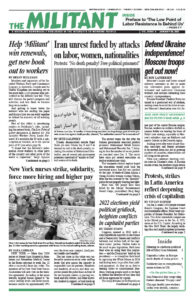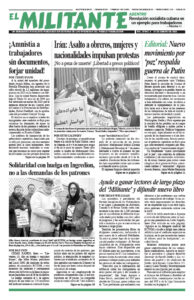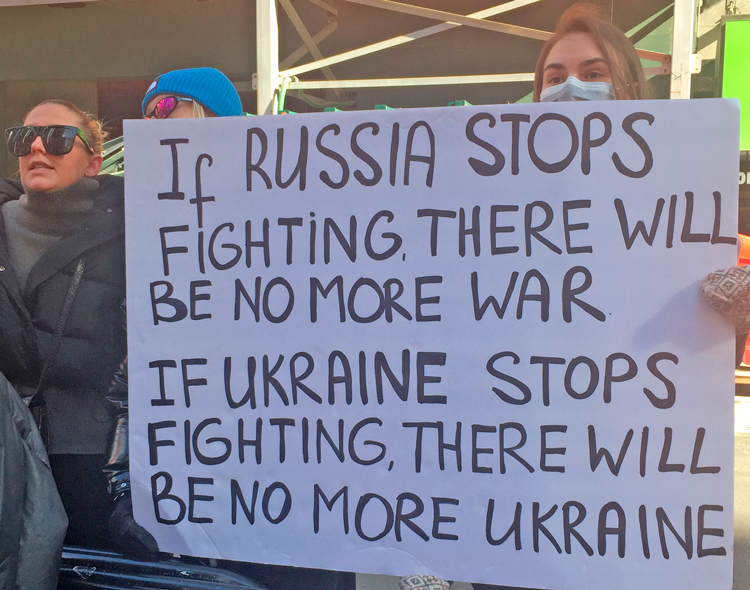Moscow’s larger and better armed military continues to fail to make any substantial gains against determined and motivated Ukrainian workers and soldiers defending their country’s independence.
Russian President Vladimir Putin has turned to a protracted war of attrition, seeking a way to restart his drive to reassert Moscow’s domination over this former part of the czarist Russian empire. Russian workers-in-uniform drafted as cannon fodder are bearing the brunt of Putin’s new strategy, especially in Moscow’s relentless siege on Bakhmut and nearby Soledar in the Donetsk region.
Sending wave after wave of new Russian conscripts and former prisoners to be mowed down has led to growing numbers of casualties, whose bodies are left lying on the ground.
Putin also continues bombing civilian areas in Ukraine’s cities. A Russian missile strike, the deadliest single attack on a civilian target in months, hit an apartment building in Dnipro Jan. 15, killing at least 44 and injuring scores.
Over 550 volunteers joined the dayslong rescue operation, scrambling to reach survivors, often removing rubble with their bare hands. Emergency crews worked through the frigid night and all day at the building, where some 1,700 people had lived. Tents were set up and city residents donated food and warm clothes for those who had lost their homes.
Workers used a crane to rescue people trapped on the upper floors. Some signaled for help turning on lights on their mobile phones. Scores were rescued but many remain missing.
Reports keep surfacing about the vital role played by working people in stopping Moscow’s initial blitzkrieg assault to try to take Kyiv, the capital, and occupy the country. The Russian soldiers were told they’d be welcomed as saviors, but instead met fierce, effective resistance.
In Ukraine’s northeast, 20 miles from the Russian border the city of Sumy was defended by volunteers. For weeks they succeeded in disrupting supply lines for the invaders, helping block them from reaching Kyiv.
Serhiy and Ihor, both 29, were City Council workers who told the Guardian they immediately grabbed weapons to resist the invaders. Of the 400 Sumy residents who organized themselves to fight the first day, only about 20 had previous military training. Soon thousands of working people joined the battle.
People got “arms from an army warehouse” and organized groups, Ihor said, armed with rifles and homemade bombs, using their cars to set up ambushes.
“Everyone started working for the victory,” Serhiy said, describing how his “girlfriends from the university were bringing us boxes of Molotov cocktails.” Even grandmothers texted or phoned to tell them of any Russian incursions. “Because of this, the city was able to withstand the invasion.”
Anger grows in Russia over losses
Anger is simmering among Russian families from the Volga region of Samara faced with burying sons who died in one of the most deadly incidents of the Ukraine war. Scores if not hundreds of Russian soldiers, mostly men drafted from Samara, were killed — the Kremlin admits 89 fatalities — when Ukrainian rockets hit a temporary barracks in the Russian-occupied Ukrainian city of Makiivka New Year’s Day.
Among those killed was Andrei Yumadilov, a father of two who was an oil-and-gas field welder. He was a churchgoer who was against the war, a friend told the Wall Street Journal. The two last spoke two weeks before the strike, when Yumadilov grimly and dejectedly described life on the front lines. “A lot of people don’t understand why all these men are being sent to die,” the friend said. “Because in reality, no one attacked us, no matter what they try to tell us.”
“We have no morale, just fear and constant stress,” a 27-year-old electrician draftee told independent Russian media outlet Verstka, describing how he and other conscripts were ordered to sift through the rubble searching for bodies. “This isn’t our war. We’re just trying to survive. Many of the guys don’t want to be here at all.”
The Russian village of Mirny, population 7,000, has had five funerals from the Makiivka strike. “When will it end?” area resident Natalia Kostyukhina said Jan. 9 on social media Vkontakte, telling the government, “Stop sending our men to the meat grinder.”


